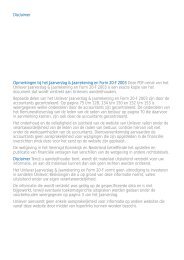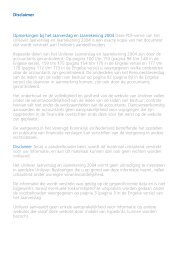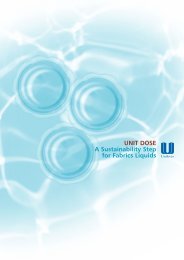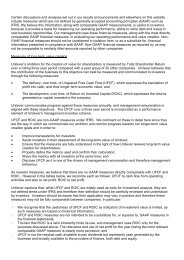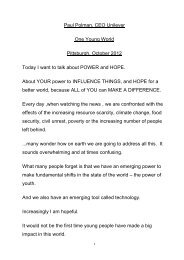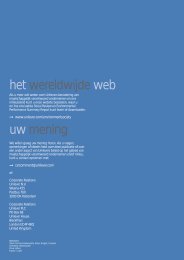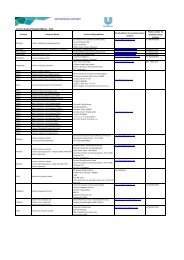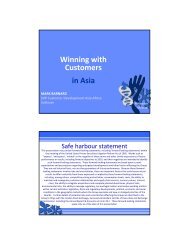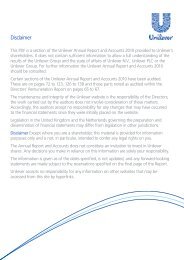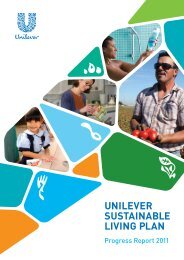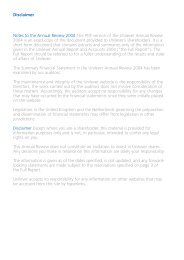Unilever Annual Report & Accounts and Form 20-F 2000
Unilever Annual Report & Accounts and Form 20-F 2000
Unilever Annual Report & Accounts and Form 20-F 2000
- TAGS
- unilever
- annual
- accounts-and-form
- f
You also want an ePaper? Increase the reach of your titles
YUMPU automatically turns print PDFs into web optimized ePapers that Google loves.
30<br />
<strong>Unilever</strong> <strong>Annual</strong> <strong>Report</strong> & <strong>Accounts</strong> <strong>and</strong> <strong>Form</strong> <strong>20</strong>-F <strong>20</strong>00 <strong>Report</strong> of the Directors<br />
Corporate governance<br />
History <strong>and</strong> organisational structure of <strong>Unilever</strong><br />
NV <strong>and</strong> PLC are the two parent companies of the <strong>Unilever</strong><br />
Group of companies. NV was incorporated under the<br />
name Naamlooze Vennootschap Margarine Unie in the<br />
Netherl<strong>and</strong>s in 1927. PLC was incorporated under the<br />
name Lever Brothers Limited in Great Britain in 1894.<br />
Since 1930 when the <strong>Unilever</strong> Group was formed, NV <strong>and</strong> PLC<br />
have operated, as nearly as is practicable, as a single entity.<br />
They have the same directors, adopt the same accounting<br />
principles, <strong>and</strong> are linked by a series of agreements. The<br />
Equalisation Agreement, which regulates the mutual rights of<br />
the two sets of shareholders, is particularly important. It makes<br />
the position of the shareholders of both companies, as far as<br />
possible, the same as if they held shares in a single company.<br />
NV <strong>and</strong> PLC are separate companies, with separate stock<br />
exchange listings <strong>and</strong> different shareholders. You cannot<br />
convert or exchange the shares of one for shares of the<br />
other <strong>and</strong> the relative share prices on the various markets<br />
can, <strong>and</strong> do, fluctuate. This happens for a number of<br />
reasons, including changes in exchange rates. However,<br />
over time the prices of NV <strong>and</strong> PLC shares do stay in<br />
close relation to each other, in particular because<br />
of our equalisation arrangements.<br />
NV <strong>and</strong> PLC are holding <strong>and</strong> service companies. Our<br />
businesses are carried out by our Group companies around<br />
the world. The holding companies have agreed to co-operate<br />
in all areas, to exchange all relevant business information<br />
<strong>and</strong> to ensure all group companies act accordingly. In most<br />
cases, shares in the group companies are held ultimately by<br />
either NV or PLC. The main exception is that US companies<br />
are owned by both – 75% by NV <strong>and</strong> 25% by PLC. These<br />
arrangements are designed to create a balance between the<br />
funds generated by the NV <strong>and</strong> PLC parts of the Group.<br />
Shares in Bestfoods’ companies worldwide were acquired<br />
by <strong>Unilever</strong> United States, Inc. As a result they are currently<br />
ultimately owned by NV <strong>and</strong> PLC in the ratio 75:25.<br />
See page 101 for a listing of the Group’s principal<br />
subsidiaries <strong>and</strong> also Control of <strong>Unilever</strong> on page 112.<br />
Directors<br />
The Chairmen <strong>and</strong> all of the directors are full-time<br />
executives <strong>and</strong> directors of both NV <strong>and</strong> PLC <strong>and</strong>, as well<br />
as holding specific management responsibilities, they are<br />
responsible for the conduct of the business as a whole. The<br />
Legal structure of the Group<br />
Shareholders<br />
NV<br />
NV Owned<br />
Operating Companies<br />
Directors<br />
Equalisation <strong>and</strong><br />
other agreements<br />
Jointly Owned<br />
Operating Companies<br />
Shareholders<br />
PLC<br />
PLC Owned<br />
Operating Companies<br />
Chairmen of NV <strong>and</strong> PLC are the principal executive officers<br />
of <strong>Unilever</strong>.<br />
During <strong>20</strong>00, our operations worldwide were organised into<br />
12 Business Groups, each with a Business Group President.<br />
With effect from 1 January <strong>20</strong>01, our operations have<br />
been organised into two global divisions – Foods <strong>and</strong><br />
Home & Personal Care (HPC) – headed by Division Directors.<br />
For details of the Division Directors <strong>and</strong> Business<br />
Presidents, see pages 33 to 35.<br />
The directors have set out a number of areas for which the<br />
Boards have direct responsibility for decision-making. They<br />
meet to consider the following corporate events <strong>and</strong> actions:<br />
• Agreement of quarterly results announcements<br />
• Approval of the <strong>Annual</strong> <strong>Report</strong> <strong>and</strong> <strong>Accounts</strong><br />
• Declaration of dividends<br />
• Convening of shareholders’ meetings<br />
• Approval of corporate strategy<br />
• Authorisation of major transactions<br />
All other matters are delegated to committees whose<br />
actions are reported to <strong>and</strong> monitored by the Boards.<br />
Board meetings are held in London <strong>and</strong> Rotterdam <strong>and</strong><br />
chaired by the Chairmen of NV <strong>and</strong> PLC. The Chairmen<br />
are assisted by the Joint Secretaries, who ensure the Boards<br />
are supplied with all the information necessary for their<br />
deliberations. Information is normally supplied a week<br />
prior to each meeting.<br />
Directors are elected by shareholders at the <strong>Annual</strong> General<br />
Meetings of NV <strong>and</strong> PLC, to hold office until the end of the<br />
next AGM. For details of the nomination procedure for<br />
directors, see Control of <strong>Unilever</strong> on page 112. All directors<br />
submit themselves for re-election each year <strong>and</strong> retire at the<br />
latest by the age of 62. They are executive officers, <strong>and</strong><br />
cease to hold executive office on ceasing to be directors.<br />
We appoint our other executive officers, who are full-time,<br />
for an indefinite period. None of our directors or executive<br />
officers is elected under any arrangement or underst<strong>and</strong>ing.<br />
All of our directors have been with <strong>Unilever</strong> full-time for<br />
at least five years, <strong>and</strong> in most cases for most of their<br />
business careers. For details see pages 33 to 35.<br />
There are no family relationships between any of our<br />
directors or executive officers.<br />
Advisory Directors<br />
The Advisory Directors are the principal external presence in<br />
the governance of <strong>Unilever</strong>. The role of an Advisory Director<br />
involves giving advice to the Boards in general, <strong>and</strong> to the<br />
Executive Committee in particular, on business, social <strong>and</strong><br />
economic issues. One of their key roles is to assure the<br />
Boards that our corporate governance provisions are



